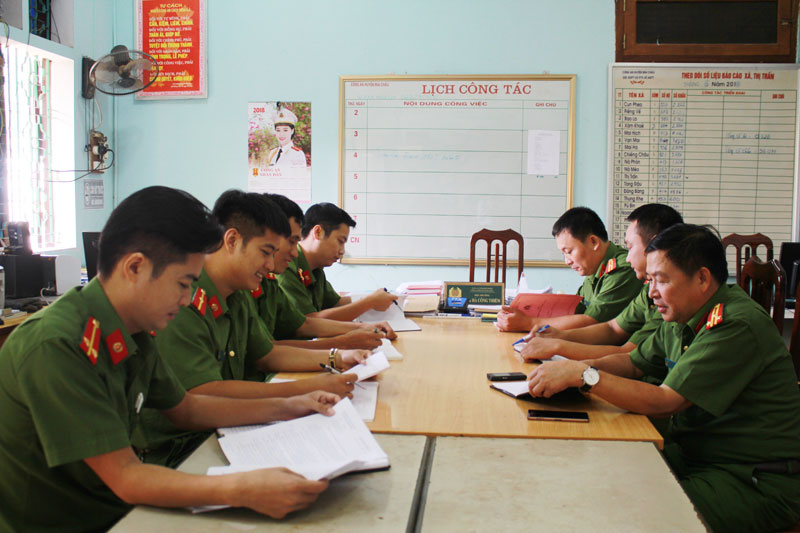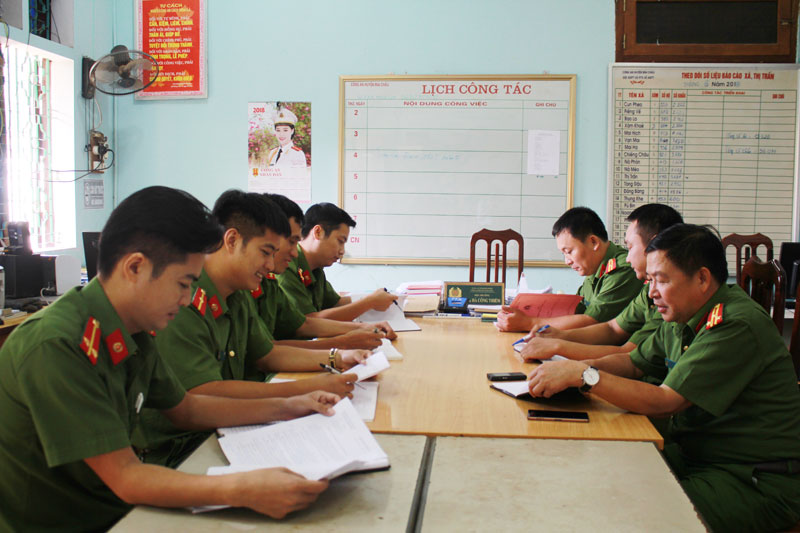
(HBO) – The police force of Mai Chau district reported that 62 cases of law violations on social order and safety had occurred in the district during the first nine months of this year.
Photo: Mai Chau district police in a meeting to
discuss measures against crime, including those related to drugs.
Thanks to the ingenuity, proactiveness,
drastic efforts, and close coordination with competent authorities, local
police has discovered 38 drug crimes and arrested 45 drug traffickers since the
outset of the year. According to the district police’s statistics, the district
has 81 wanted suspects and 261 drug addicts, including 147 addicts using
methadone.
In the first six months of the year, police forces at communes and towns set up
drug detoxification files for 33 addicts, and sent 10 addicts to the local detoxification
centre.
The district police have joined hands with communal People’s Committees to
organise 17 communication campaigns to popularise laws for 1,600 locals. Also,
it worked with provincial police and police in Hang Kia commune to mobilise
residents to hand in 54 hand-made guns, 38 bullets, and one sword.
In addition, 12 articles and many compact disks have been issued to inform
local residents about criminals’ tricks and activities.
Particularly, self-management models have been maintained and shown efficiency
in the movement of people-based security protection. Currently, the district is
home to 742 self-management groups, including 400 social security groups, 12
self-management families in Hang Kia and Pa Co communes, 138 security groups
and 138 conciliation groups. In areas vulnerable to security problems such as
Hang Kia and Pa Co, the model of self-management families has contributed to
reducing the number of cases related to social disorder. The number of such
cases in the two communes dropped by 3-5 compared to previous years.
This is a vivid illustration for the important role of the people in fighting
crimes, ensuring social order and security./.
The emulation movement "Hoa Binh joining hands to build new-style rural areas” has been widely spreading, becoming a driving force that motivates the localities to renew rural landscapes and improve the material and spiritual lives of the residents. In this movement, the people play a central role-both as the main implementers and direct beneficiaries of its outcomes.
In response to the global digital revolution, Hoa Binh Newspaper is transforming itself into a modern and multi-platform media hub, blending cutting-edge technology with a restructured newsroom and a new generation of tech-savvy journalists.
Hoa Binh province’s Association of the Elderly recently held a conference to review the project on expanding the inter-generation self-help club model until 2025.
In a move to implement Resolution No. 57-NQ/TW, issued on December 22, 2024 by the Politburo, which targets breakthroughs in science-technology development, innovation, and digital transformation, the Hoa Binh provincial Department of Health has issued a plan to roll out the "Digital Literacy for All” campaign within the local health sector.
An Nghia Commune (Lạc Sơn District) is one of the communes that achieved the tha standard of the national new rural area in 2018. Entering a new development phase, the commune is now trying to meet the criteria for the advanced new rural development. With the strong political will and the public consensus, the commune is gradually overcoming the challenges to reach this goal, aiming for the sustainable development.



